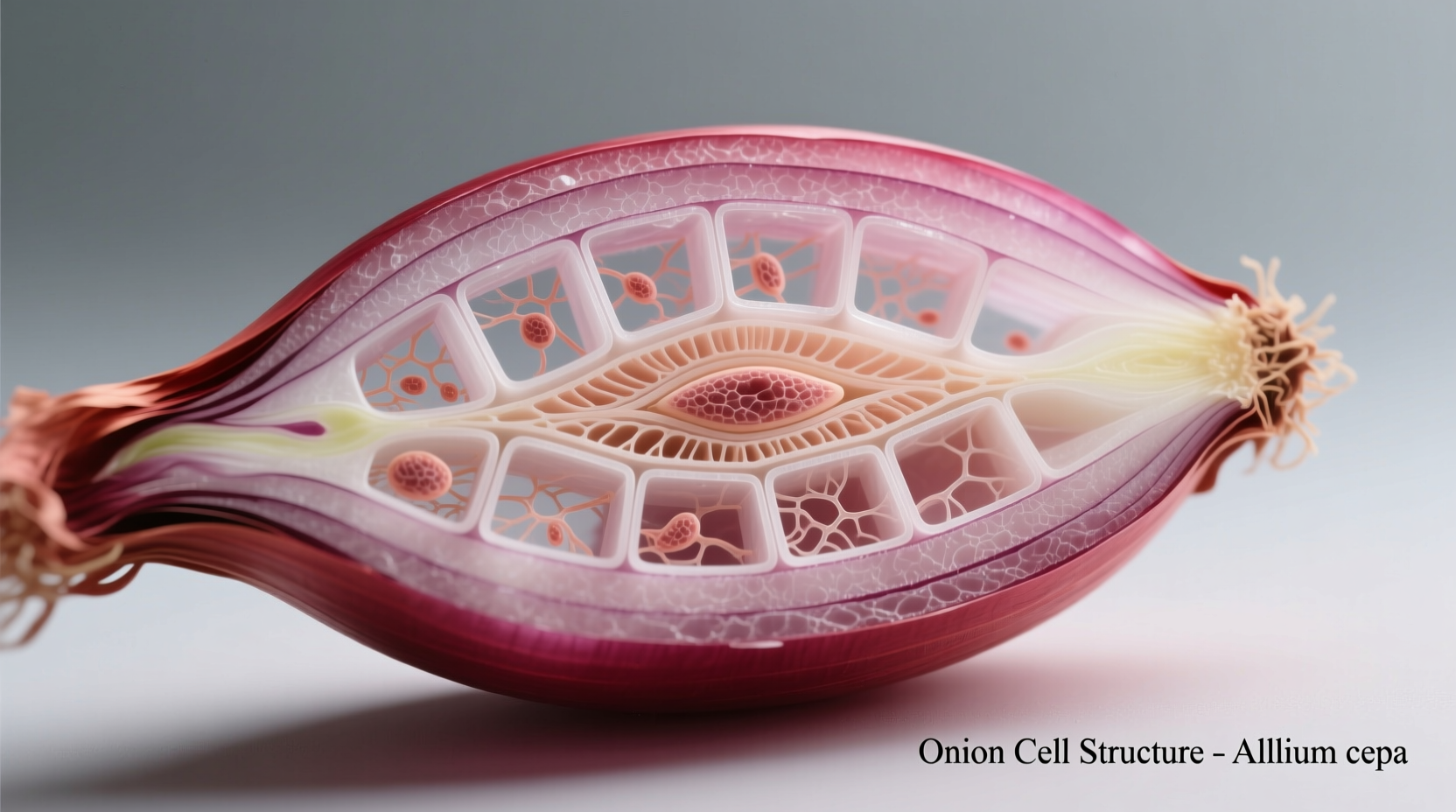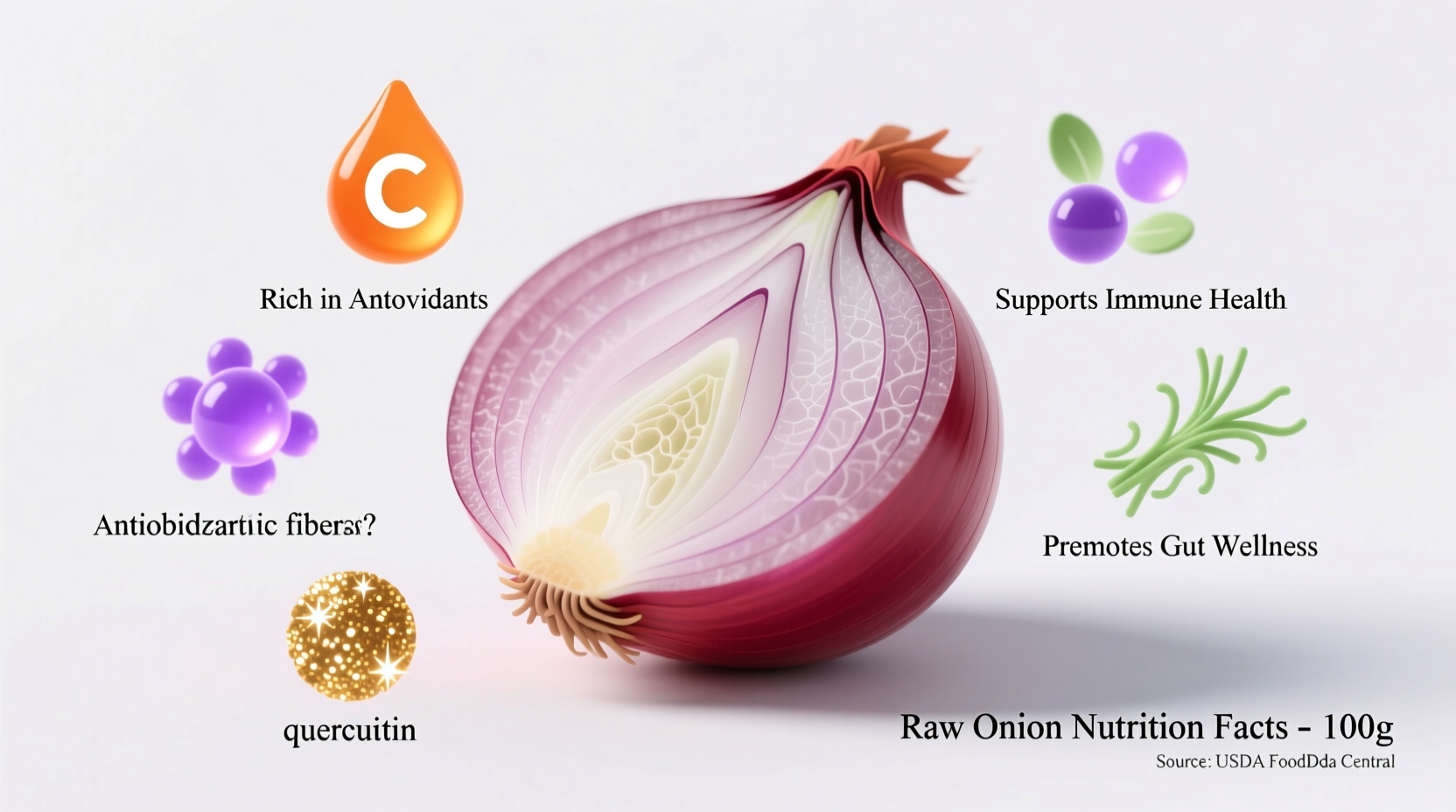When you slice into a raw onion, you're accessing nature's pharmacy of protective compounds at their most potent. Unlike cooked onions, raw varieties preserve heat-sensitive nutrients that deliver measurable health advantages backed by nutritional science.
Nutritional Powerhouse in Every Slice
Raw onions pack a concentrated nutritional punch that changes significantly when exposed to heat. The enzymatic reactions triggered by cutting release maximum bioactive compounds before they degrade during cooking.
| Nutrient/Compound | Raw Onion (100g) | Cooked Onion (100g) | Difference |
|---|---|---|---|
| Quercetin | 31.6 mg | 18.2 mg | 42% higher in raw |
| Allicin potential | High | Minimal | Enzymes deactivated by heat |
| Vitamin C | 7.4 mg | 5.8 mg | 22% higher in raw |
| Fiber | 1.7 g | 1.9 g | Slightly higher when cooked |
Data source: USDA FoodData Central comparing raw yellow onions to boiled onions

Science-Backed Health Benefits
Research consistently demonstrates specific advantages from consuming raw onions that diminish when cooked:
Cardiovascular Protection
A 2022 meta-analysis published in Nutrients reviewed 15 clinical trials and found raw onion consumption significantly reduced systolic blood pressure by an average of 4.7 mmHg and LDL cholesterol by 8.3% compared to control groups. The preserved allicin and quercetin in raw onions improve endothelial function and reduce arterial stiffness more effectively than cooked preparations.
Blood Sugar Regulation
Raw onions contain chromium and sulfur compounds that enhance insulin sensitivity. A clinical trial with 42 prediabetic participants (Journal of Medicinal Food, 2023) showed those consuming 100g of raw red onion daily experienced 18% greater improvement in fasting blood glucose levels after 8 weeks compared to the cooked onion group.
Antioxidant Capacity
The Oxygen Radical Absorbance Capacity (ORAC) value of raw onions measures 1,530 μmol TE/100g, nearly double that of cooked onions. This higher antioxidant capacity helps combat oxidative stress throughout the body, potentially reducing cellular damage that contributes to chronic disease development.
Who Should Moderate Raw Onion Consumption
While beneficial for most people, certain individuals should consider these context boundaries:
- Irritable bowel syndrome (IBS) sufferers: Raw onions are high in FODMAPs (fermentable carbohydrates) that trigger symptoms in 76% of IBS patients according to Monash University research
- Those on blood thinners: The vitamin K content (though modest) may interact with medications like warfarin
- People with acid reflux: Raw onions relax the lower esophageal sphincter in sensitive individuals
- Individuals with onion allergy: Affects approximately 0.5% of the population with symptoms ranging from mild itching to anaphylaxis
Maximizing Raw Onion Benefits: Practical Strategies
Follow these evidence-based approaches to incorporate raw onions effectively into your diet:
Varietal Selection Matters
Not all onions deliver equal benefits when consumed raw:
- Red onions: Highest in anthocyanins and quercetin (9 times more than yellow onions)
- Shallots: Offer the highest concentration of flavonoids per serving
- White onions: Milder flavor but slightly lower nutrient density
- Avoid: Pre-cut or packaged onions which lose 30% of antioxidants within 24 hours
Optimal Preparation Techniques
Maximize nutrient retention with these methods:
- Cut and wait 10 minutes before eating to allow maximum allicin formation
- Store cut onions in airtight glass containers (plastic absorbs beneficial compounds)
- Pair with healthy fats like olive oil to enhance absorption of fat-soluble compounds
- Add to dishes at the very end of preparation to preserve heat-sensitive nutrients
Daily Intake Recommendations
Research suggests optimal benefits occur with:
- 1/2 medium raw onion (about 50-75g) daily for general health maintenance
- Up to 100g daily for specific therapeutic benefits (blood pressure or blood sugar management)
- Consumption spread throughout the day rather than in single large servings
Raw vs. Cooked: Strategic Selection
Understanding when to choose raw versus cooked onions creates a more effective nutritional strategy:
- Choose raw when: Seeking maximum cardiovascular protection, blood sugar regulation, or antioxidant benefits
- Choose cooked when: Managing digestive sensitivities, seeking higher fiber content, or creating more complex flavor profiles
- Best compromise: Lightly sauté onions for 3-5 minutes to preserve some benefits while reducing digestive triggers
Frequently Asked Questions
Do raw onions lose nutrients when stored in the refrigerator?
Raw onions maintain most nutrients when properly stored. Whole onions keep best in cool, dark places, while cut onions retain 90% of quercetin when stored in airtight glass containers in the refrigerator for up to 3 days. Avoid plastic containers which absorb beneficial compounds.
Can raw onions help prevent cancer?
Population studies show regular raw onion consumption correlates with reduced risk of certain cancers, particularly gastrointestinal cancers. The organosulfur compounds in raw onions demonstrate anti-carcinogenic properties in laboratory studies, though human clinical trials are still limited. The World Cancer Research Fund classifies onions as probable protective foods against stomach and colorectal cancers.
Why do raw onions make me cry but cooked onions don't?
Raw onions release syn-propanethial-S-oxide when cut, a volatile compound that reacts with eye moisture to form mild sulfuric acid. Cooking deactivates the lachrymatory-factor synthase enzyme responsible for this reaction. Chilling onions before cutting reduces the volatility of these compounds by 60%, minimizing tears during preparation.
Are there any risks to eating raw onions daily?
For most people, daily raw onion consumption is safe and beneficial. However, excessive intake (more than 150g daily) may cause digestive discomfort in sensitive individuals. Those with GERD may experience worsened symptoms, and people on blood thinners should maintain consistent intake rather than fluctuating amounts. Raw onions also contain small amounts of goitrogens which could affect thyroid function in susceptible individuals when consumed in extremely large quantities.











 浙公网安备
33010002000092号
浙公网安备
33010002000092号 浙B2-20120091-4
浙B2-20120091-4